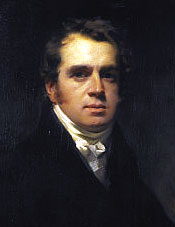| Profile | Major Works | Resources |
Francis Horner, 1778-1817.

Scottish journalist, liberal reformer and Whig statesman.
Francis Horner was born in Edinburgh, the son of linen-manufacturer. After being educated at the city's High School, Francis Horner enrolled in 1792 at the University of Edinburgh under Dugald Stewart, in the waning years of the Scottish Enlightenment. In 1797, Horner joined the "Speculative Society", a student association in Edinburgh formed back in 1764, that would carry on the spirit of the Scottish Enlightenment and transmit it nationally.
Initially set upon a legal career in Scotland, Francis Horner joined the Scottish Society of Advocates in 1800. But finding Scottish courts stuffy, Horner decided to pursue a legal career in England, and enrolled at Lincoln's Inn in April 1802 and finally moved the London in July 1803 to study for the bar. While still in Edinburgh, Horner, together with like-minded youngsters of society days Sidney Smith, Francis Jeffrey, and Henry Brougham, founded The Edinburgh Review in 1802. Staunchly liberal, ardently reformist, more Whig than the Whigs, the Edinburgh Review would be instrumental in the advance and popularization laissez-faire doctrine and Classical economics in the first half of the century.
Horner contributed many of the economics articles to the early editions of the Edinburgh Review. Horner was responsible for a brave and insightful review of Henry Thornton's Inquiry in the very first issue (Oct 1802). He went on to review Lord Peter King's tract, setting early phases of the Bullionist debate on track. Horner was probably the person most responsible for giving the Review its economics-orientation, although Horner would later leave the bulk of the economics field largely to Brougham.
The success of his old society comrade Henry Petty FitzMaurice (Marquess of Lansdowne) in the new "all-talents" government of Grenville's Whigs in 1806 lured him to try his hand at politics. With the help of the Whig patronage machine, Francis Horner was elected to Parliament in November1806. (Horner passed the English bar only in 1807, when already an MP).
Motivated by David Ricardo's articles in the Morning Chronicle, Francis Horner pushed the motion for the resumption of specie payment in parliament. Horner chaired Bullion Committee formed in February 1810, which included luminaries such as Thornton, Parnell, Baring and Huskisson, and the prime minister Spencer Perceval himself. Horner was the primary author of its famous Bullion Report delivered in June 1810, recommending the resumption of convertibility within two years. Submitted too late in the parliamentary session to be acted upon, debate was postponed until 1811. In the interval, the Bullionist debate raged with a myriad of articles and pamphlets attacking and defending the report. In May 1811, Horner finally submitted Bullion Resumption Bill, consisting of fourteen resolutions suggested by the report. Horner valiantly defended the report from the withering criticism of opponents like Sir George Rose and Nicholas Vanisttart, but to no avail. Horner's resolutions were defeated.
Horner joined forces with Rose to defeat the first attempt to introduce the Corn Laws in 1814, but was unable to prevent it from passing in 1815.
Sickly through his life, Horner suffered from a chronic pulmonary disease. Traveling to Italy at the recommendation of his doctor, Horner finally succumbed and died in Livorno, Italy on February 8, 1817, at the age of thirty-eight.
Francis Horner's brother, Leonard Horner, was one of the founders of the Edinburgh School of Arts in 1821 which set the Mechanics Institutes movement in motion.
|
Major Works of Francis Horner
|
|
HET
|
|
Resources on Francis Horner
|
All rights reserved, Gonšalo L. Fonseca
